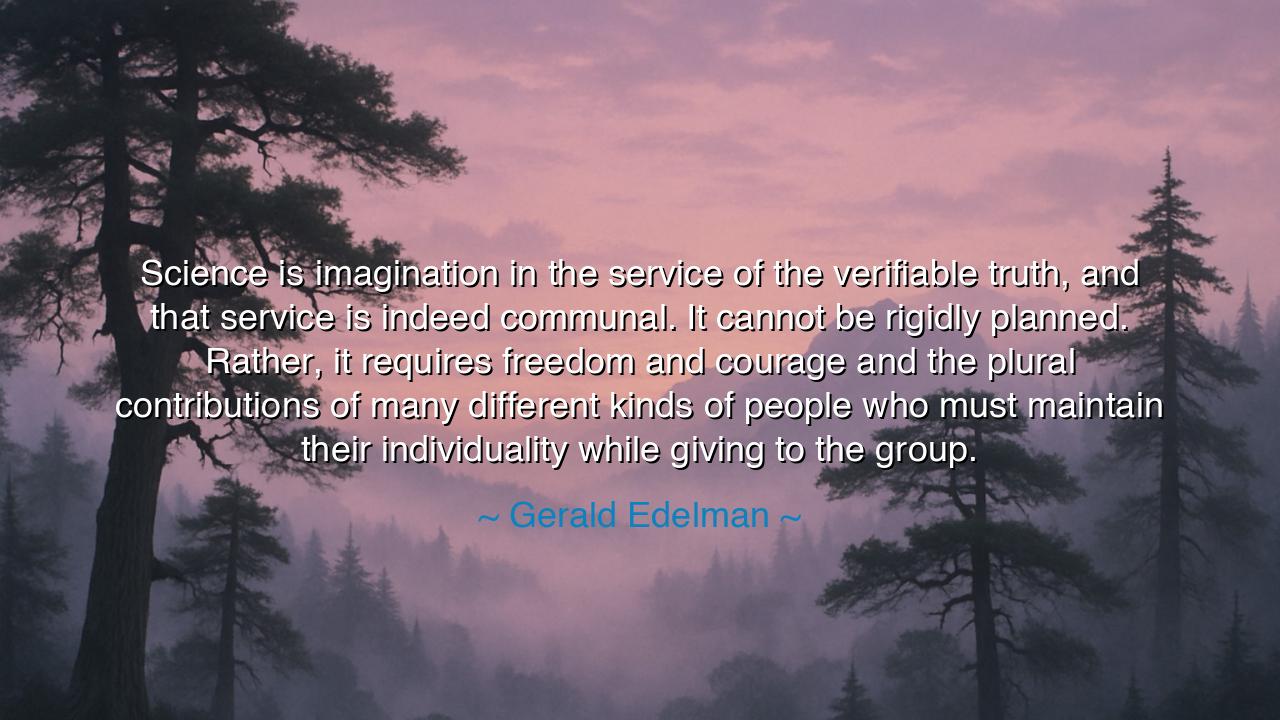
Science is imagination in the service of the verifiable truth
Science is imagination in the service of the verifiable truth, and that service is indeed communal. It cannot be rigidly planned. Rather, it requires freedom and courage and the plural contributions of many different kinds of people who must maintain their individuality while giving to the group.






The words of Gerald Edelman — “Science is imagination in the service of the verifiable truth, and that service is indeed communal. It cannot be rigidly planned. Rather, it requires freedom and courage and the plural contributions of many different kinds of people who must maintain their individuality while giving to the group.” — shine with the light of deep wisdom. In these lines, Edelman, a Nobel laureate and a thinker of extraordinary breadth, reveals the living soul of science — not as a cold, mechanical pursuit, but as a grand and noble collaboration between the mind’s imagination and the heart’s courage. He reminds us that the search for truth is not a solitary act of intellect, but a communal journey, alive with creativity, diversity, and freedom.
To Edelman, science was not a fixed path laid out by rules, but a living river — flowing, branching, unpredictable. His work in understanding the human brain had shown him that creativity and discovery cannot be commanded by decree. Just as life itself evolves through variation and adaptation, so too must science advance through the meeting of many minds, each unique and independent, yet united by a shared devotion to truth. The imagination he speaks of is not the idle dreaming of fantasy, but the sacred ability to see beyond the known — to shape hypotheses, to envision possibilities that reality has not yet revealed. And this imagination, when wedded to verification and evidence, becomes the engine of progress.
Edelman’s insight echoes the ancient harmony between the artist and the philosopher. The ancients believed that discovery was born from wonder — that before knowledge, there must be awe. In this sense, Edelman restores science to its rightful grandeur: as both an act of reason and an act of creation. He understood, as did Leonardo da Vinci, that invention requires both logic and vision. Leonardo painted and designed, dissected and dreamed — never separating the poetic from the empirical. So too did Edelman see that the mind’s highest power lies in its union of freedom and truth, imagination and evidence, individuality and collaboration.
Consider the story of the Manhattan Project, a moment in history where science stood both at its most magnificent and its most perilous. There, in secret laboratories, some of the world’s greatest minds gathered — Einstein, Fermi, Oppenheimer, Bohr, and others. They embodied the communal spirit Edelman describes: men and women of diverse talents, backgrounds, and temperaments, working toward a single goal. Yet their work also revealed the danger of science without wisdom, of imagination ungoverned by conscience. The project’s creation of the atomic bomb brought victory but also terror, reminding humanity that the pursuit of truth must always be tempered by the light of morality and humility. Freedom and courage, yes — but also responsibility.
Edelman’s quote also speaks of individuality within collaboration, a truth that lies at the heart of all human advancement. Each mind, like a star in the night sky, must shine with its own light — yet together, those lights form constellations that guide generations. To lose individuality in the name of conformity is to dim the very spark that fuels discovery. To isolate oneself from the group is to lose the collective strength that wisdom requires. True progress, Edelman teaches, comes when the individual contributes freely to the whole — when diversity of thought becomes the forge of truth.
There is also profound courage in Edelman’s vision of science. To question the accepted, to experiment beyond certainty, to follow a hypothesis into the unknown — this requires bravery of spirit. The scientist, like the explorer or the philosopher, walks between light and darkness, seeking meaning amid uncertainty. This courage is not arrogance but devotion — a faith that truth, however distant, can be approached through persistence, humility, and shared effort. Thus, science, at its noblest, becomes a human covenant: the agreement that truth is worth the struggle, that imagination must serve evidence, and that knowledge belongs not to one, but to all.
So, dear listener, let this teaching be remembered. In whatever work you do — whether in science, art, or the simple labor of daily life — unite imagination with truth, and freedom with service. Value the diversity of minds around you; listen, learn, and contribute your own light. Do not fear the unknown, for it is the cradle of discovery. And never let your individuality be drowned by the crowd — for only through many voices can the great song of knowledge be sung.
In the end, Edelman’s wisdom stands as both a call and a blessing: let us seek verifiable truth with imaginative hearts, let us labor together with courage and respect, and let us remember that the miracle of human progress is born not from uniformity, but from the union of free spirits working as one. This is the true art of science — and indeed, the art of life itself.






AAdministratorAdministrator
Welcome, honored guests. Please leave a comment, we will respond soon